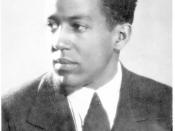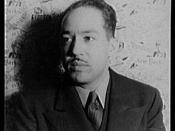During the early 1930s many black writers begin to produce works that helped to shape and define the Civil Rights movement. Among them was Langston Hughes whose poems and writing contributed directly to the rhetoric of the day and inspired many African-Americans, both in and out of the Civil Rights movement. Much of this grew out of what was called the Harlem Renaissance, which emerged during turbulent times for the world, the United States, and black Americans. World War I and the Bolshevik Revolution of 1917 had left the world in disorder and stimulated anti-colonial movements throughout the third world. In America, twenty years of progressive reform ended with the red scare, race riots, and isolationism throughout 1919 and led to conservative administrations through the twenties. While blacks were stunned by racial violence near the end of the decade and were frustrated by the lack of racial progress that progressivism had made, they were now armed with new civil rights organizations and confronted the approaching decade with new hope and determination.
Education and employment opportunities had led to the development of a small black middle class, and few blacks thought that their future lay in the economically depressed rural South, resulting in hundreds of thousands migrating to seek prosperity and opportunity in the North. As these more educated and socially conscious blacks settled into New York's neighborhood of Harlem, it developed into the cultural and political center of black America. It is out of this environment that Langston Hughes developed. In 1926, professor Alain Locke (1969) observed, "The younger generation is vibrant with a new psychology," which was shown by a shift from "...social disillusionment to race pride." Locke noted that this new psychology rejected the old stereotypes of black "aunties, uncles, and mammies" and substituted instead self-respect, self-dependence, and...


